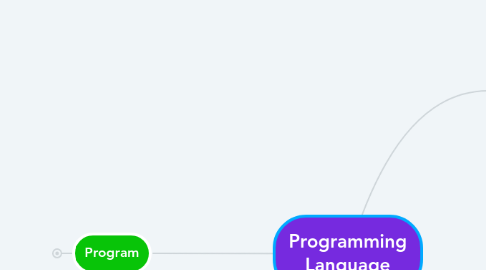
1. Tokens
1.1. Keywords
1.1.1. Predefined words in a Programming Language
1.2. Identifiers
1.2.1. Words defined by the Programmer
1.2.1.1. Length shall range from1 to 256 Characters
1.2.1.2. It can contain letters form A to Z, a to z and 0 to 9
1.2.1.3. No other special Character is allowed apart from Underscore _
1.2.1.4. Cannot start with a Digit
1.2.1.5. Cannot be a keyword
1.3. Operators
1.3.1. Symbols that perform well defined Task
1.3.1.1. Unary
1.3.1.1.1. Works with One values
1.3.1.2. Binary
1.3.1.2.1. Works with 2 values
1.3.1.3. Ternary
1.3.1.3.1. It has 3 parts
1.3.1.4. As per task Performed they are classified into 9 types
1.3.1.4.1. Assignment
1.3.1.4.2. Arithmetic
1.3.1.4.3. Relational
1.3.1.4.4. Logical
1.3.1.4.5. Increment / Decrement
1.3.1.4.6. Combination Operators
1.3.1.4.7. Special Operators
1.3.1.4.8. Conditional Operator
1.3.1.4.9. Bitwise Operators
1.4. String
1.4.1. Collection of Characters
1.4.1.1. ' Enclosed in Single Quotes ' or "Dobule Quote"
1.5. Literals or Constants
1.5.1. Constant Values
1.5.1.1. -12, 45.2, 39
2. Syntax
2.1. Rules to generate Statements by combining tokens
3. Statements
3.1. Memory
3.1.1. Datatype name
3.1.1.1. Datatypes
3.1.1.1.1. Basic
3.1.1.1.2. Complex
3.1.1.2. name
3.1.1.2.1. name - Identifier Rules to frame them
3.2. A / L
3.2.1. Unary
3.2.1.1. OPValue or valueOP
3.2.2. Binary
3.2.2.1. value1 OP value2
3.2.3. Ternary
3.2.3.1. Part1? Part2 : Part3
3.3. Output
3.3.1. To display content on the log file
3.3.1.1. Only Message
3.3.1.1.1. "messge " or ' message '
3.3.1.2. Only Value
3.3.1.2.1. Literal or name
3.3.1.3. Combination Value and Message
3.3.1.3.1. "message" , + name
3.4. Input
3.4.1. Capture data from End User
3.5. Control
3.5.1. Simple Condition
3.5.1.1. IF and its Flavours
3.5.1.1.1. Simple if
3.5.1.1.2. Simple If Else
3.5.1.1.3. Series of IF Else
3.5.1.1.4. Nested If
3.5.1.1.5. Series of If
3.5.1.2. Switch Case
3.5.2. Iterative / Repeatative Condition Loop
3.5.2.1. For
3.5.2.1.1. Start
3.5.2.1.2. Stay/Stop
3.5.2.1.3. Step
3.5.2.1.4. Statement
3.5.2.2. For Each
3.5.2.2.1. for each element in collection perform the task
3.5.2.3. While
3.5.2.4. Do While
3.5.3. Jump
3.5.3.1. Goto
3.5.3.2. return
3.5.3.3. Methods / Functions
3.5.3.3.1. Prototype
3.5.3.3.2. Definition
3.5.3.3.3. Call
3.5.3.4. Exception Handling
3.5.3.4.1. Try
3.5.3.4.2. catch
4. Program
4.1. Structured Programming
4.1.1. Functions | Method calling each other and exchnageing or sharing data between them
4.1.1.1. Data
4.1.1.2. Functions | Methods
4.2. Object Oriented Progrmming
4.2.1. Encapsulation
4.2.1.1. Class
4.2.1.1.1. Business Class
4.2.1.1.2. Built in Class
4.2.1.1.3. Service Class
4.2.1.1.4. Test Class
4.2.1.2. Interface
4.2.1.2.1. Only method Prototypes
4.2.2. Abstraction
4.2.2.1. Private
4.2.2.1.1. Only with the Encpasulation
4.2.2.2. Protected
4.2.2.2.1. Within the encapsulation and also in related Encapsulation
4.2.2.3. Publilc
4.2.2.3.1. Any where, open for all
4.2.2.4. Global
4.2.2.4.1. Throughout Salesforce.com Org
4.2.3. Polymorphism
4.2.3.1. Overloading
4.2.3.1.1. Definition
4.2.3.2. Overriding
4.2.4. Inheritance
4.2.4.1. Single or Simple
4.2.4.2. Multi Level
4.2.4.3. Hierarchical
4.2.4.4. Multiple
4.2.4.5. Hybrid
4.3. Metrics / Standards/ Best Practices
4.3.1. Comments
4.3.1.1. Single line
4.3.1.1.1. //followed is ignored
4.3.1.2. Multiple Line
4.3.1.2.1. /*multiple Lines To Comment*/
4.3.2. Indentation
4.3.3. Naming Conventions
4.3.3.1. ClassName
4.3.3.2. methodName
4.3.3.3. variablename
4.3.3.4. CONSTANTNAME
